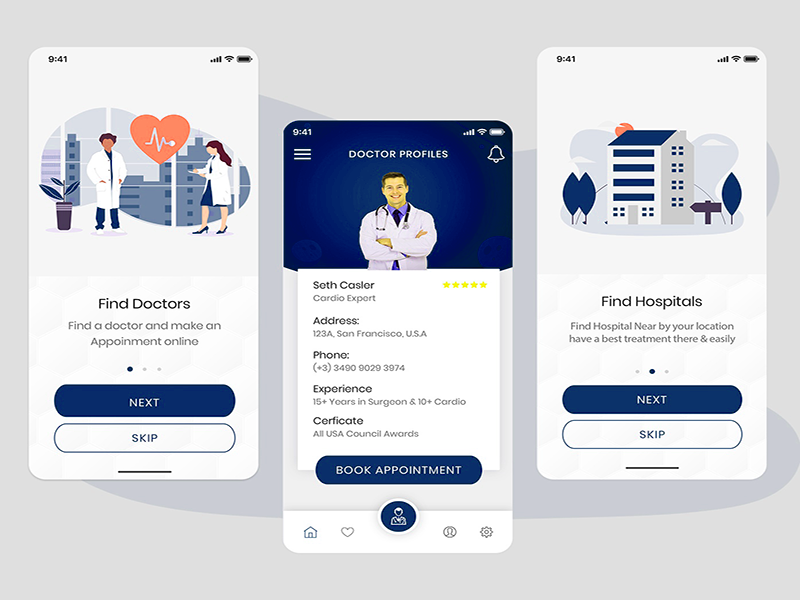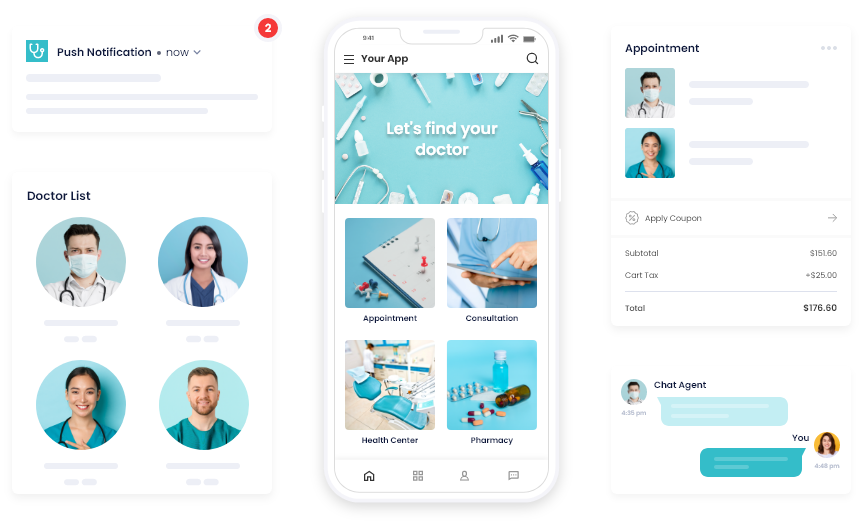The Future of Healthcare: Why Clinics Required a Mobile Application Today
As the health care landscape remains to evolve, clinics encounter installing pressure to adapt to individual expectations for greater benefit and ease of access. The combination of mobile applications can work as an essential method for improving client involvement and enhancing procedures. By leveraging technology to improve interaction and give vital services, clinics not just attend to present demands however also place themselves for future success. The ramifications of this shift expand past simple functional effectiveness; they could redefine client partnerships and care shipment in profound ways. What might this improvement resemble for both clients and clinics?
Changing Patient Assumptions
As the landscape of health care progresses, patient assumptions are going through a considerable transformation. Today's individuals are progressively seeking convenience, availability, and individualized treatment.
Furthermore, individuals are becoming much more educated and empowered, frequently looking into problems and treatments on the internet before assessments. This enhanced recognition is coupled with a need for transparency in health care processes, including expense price quotes and therapy alternatives. Because of this, providers are urged to adjust by taking on electronic devices that boost the client experience.
The assumption for prompt and efficient communication has actually never been greater, with many people thinking about responsiveness a critical part of top quality care. mobile app for clinics. In this advancing landscape, health care companies should acknowledge these transforming expectations and utilize mobile applications to foster a more patient-centric strategy, making certain that they not only satisfy yet exceed the requirements set by today's enlightened consumers
Enhancing Individual Engagement

Mobile applications assist in communication between patients and healthcare carriers, enabling real-time appointment scheduling, tips for medication adherence, and direct messaging features. These functionalities not just improve convenience but also build a sense of liability among patients. Furthermore, mobile apps can supply instructional content tailored to individual demands, assisting clients better understand their conditions and therapy options.
The assimilation of gamification components within health care apps can additionally encourage patients to engage in healthy actions, strengthening positive way of living changes. Inevitably, enhancing client engagement via mobile applications leads to enhanced health outcomes, higher person satisfaction, and an extra collaborative health care experience.
Enhancing Clinic Operations
Simplifying clinic operations is important for improving operations performance and optimizing client care. The implementation of mobile applications can dramatically decrease management problems, allowing health care suppliers to concentrate much more on patient interactions. By automating consultation scheduling, individual check-ins, and billing procedures, facilities can lessen wait times and improve overall operational performance.
Mobile apps additionally promote real-time access to patient documents, making it possible for healthcare experts to make enlightened try this choices rapidly. This immediacy not just enhances the top quality of care yet also lowers the likelihood of errors related to misplaced or outdated details. Additionally, leveraging mobile innovation sustains an extra organized method to managing person follow-ups and treatment strategies, ensuring that no critical steps are forgotten.
In addition, mobile apps can simplify stock monitoring by offering centers with devices to monitor materials and drugs successfully. This allows for prompt replenishment and aids avoid interruptions in patient treatment because of More about the author stock lacks. By incorporating these capabilities into their everyday procedures, clinics can create an extra effective and natural setting, eventually bring about enhanced individual end results and satisfaction. Embracing mobile modern technology is not simply a pattern; it is a required advancement in the health care landscape.
Improving Interaction Networks
Effective interaction is frequently cited as a cornerstone of top quality medical care delivery. In today's fast-paced clinical setting, mobile applications can significantly boost interaction channels between clinics, clients, and doctor. By integrating mobile applications into their operations, clinics can promote real-time interactions, ensuring that clients obtain prompt information concerning their visits, examination results, and treatment strategies.
Mobile apps likewise equip individuals to connect directly with their healthcare groups through secure messaging functions. This direct line of communication fosters a sense of engagement and enables prompt clarification of problems, which can bring about better adherence to treatment methods. Press alerts can remind clients of upcoming visits or medicine timetables, minimizing no-show rates and enhancing general health results.

Staying Competitive in Medical Care
In a quickly progressing health care landscape, organizations need to prioritize advancement and adaptability to keep an one-upmanship. The combination of mobile applications into medical care services is no more optional; it is vital for clinics aiming to boost person interaction, streamline operations, and enhance overall service distribution.
As patients progressively depend on digital systems for health and wellness administration, clinics that stop working to embrace mobile innovation risk dropping behind. A properly designed mobile application can provide features such as visit scheduling, telemedicine examinations, and accessibility to clinical documents, giving individuals with ease and promoting visit their website commitment.

Rivals are also buying mobile options, so staying ahead needs continuous improvement and remaining notified about technological developments. Clinics must not just implement mobile applications however also participate in normal updates and improvements. Eventually, the effective combination of mobile modern technology will certainly differentiate forward-thinking medical care organizations and established the benchmark for patient-centric treatment in a digital globe.
Conclusion
To conclude, the assimilation of mobile applications in facilities is imperative to attend to the developing landscape of person assumptions. By boosting person engagement, improving operations, and boosting communication networks, clinics can dramatically increase health outcomes. In addition, the fostering of mobile innovation positions centers to remain affordable in an increasingly digital healthcare atmosphere. Eventually, the tactical implementation of mobile apps stands for a critical step toward delivering available and individualized medical care, thus meeting the requirements these days's equipped individuals.
Eventually, boosting client interaction with mobile applications leads to boosted health end results, higher client fulfillment, and an extra collaborative health care experience.Mobile apps likewise promote real-time access to client documents, allowing medical care specialists to make educated choices quickly. In today's fast-paced medical environment, mobile applications can substantially enhance communication channels between clinics, individuals, and medical care providers.Mobile applications likewise equip clients to interact directly with their healthcare groups via protected messaging functions. Inevitably, the critical implementation of mobile applications represents a vital action toward delivering available and personalized healthcare, therefore fulfilling the demands of today's encouraged patients.